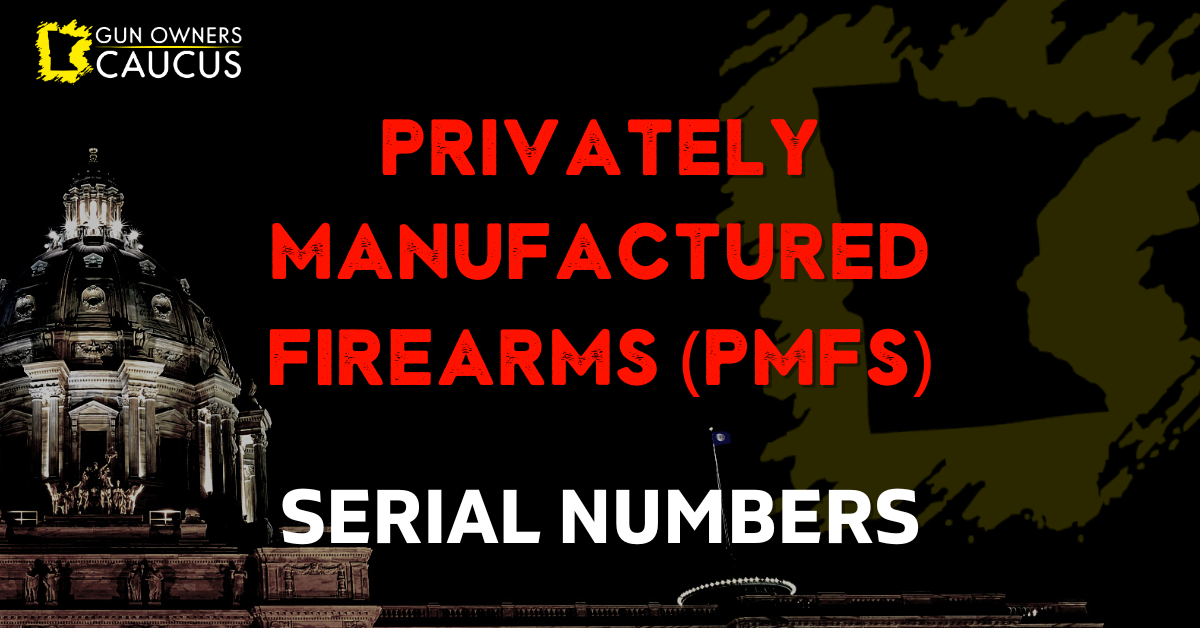
Updated: June 19th, 2023
Minnesota Statute 609.667 renders the possession of firearms with removed or obliterated serial numbers illegal. Notably, the statute extends its jurisdiction to firearms not identified by a serial number, as characterized under the United States Code, Title 26, Section 5842, a part of the National Firearms Act.
The Minnesota Gun Owners Caucus (MNGOC) confidently asserts that the legislature intended this statute to pertain exclusively to firearms mandatorily serialized under federal law, thus excluding firearms not federally required to be serialized, like privately manufactured firearms.
Here we will discuss the statutory language, legislative history, and related law to corroborate the MNGOC’s interpretation.
Privately Manufactured Firearms
Minnesota statutes are silent on the topic of privately manufactured firearms. At the federal level, the ATF acknowledges the legality of privately manufacturing firearms for personal use, as clarified in their FAQ:
“A license is not required to make a firearm solely for personal use… However, a license is required to manufacture firearms for sale or distribution…” (referencing 18 USC 922(o), (p), and (r); 26 USC 5822; 27 CFR 478.39, 479.62, and 479.105)
Statutory Language
Minnesota Statute 609.667 recognizes “serial number or other identification” as “the serial number and other information required under United States Code, title 26, section 5842, for the identification of firearms.”
This definition unambiguously confirms that the statute is targeted at firearms federally regulated and required to be serialized under the National Firearms Act (NFA).
Importantly, the NFA does NOT require serialization or registration of firearms manufactured for personal use, unless they fall under the NFA’s scope. Therefore, such firearms are clearly not subject to Minnesota Statute 609.667.
Legislative History
The legislative evolution of Minnesota Statute 609.667 substantiates the MNGOC’s stance.
Introduced in 1994 as part of a comprehensive gun control initiative, legislative discourse emphasized curtailing gun trafficking and criminal firearm usage. The statute’s application to privately manufactured firearms for personal use by non-prohibited, peaceable individuals was not deliberated.
Had the legislature intended to incorporate such firearms, the statute would have explicitly done so.
Instead, the legislature relied on the definition of serial numbers for firearms that are required to be serialized by federal law.
Rule of Lenity
The rule of lenity, a guiding principle in statutory interpretation, mandates that any ambiguity in a criminal statute is resolved favorably for the defendant, ensuring no individual faces punishment for unclearly prohibited conduct.
In the context of Minnesota Statute 609.667, the statute’s applicability to privately manufactured firearms for personal use remains unclear with even the most restrictive interpretation.
Therefore, in case of any interpretative ambiguity, the rule of lenity bolsters MNGOC’s interpretation that the statute should not extend to these firearms.
Doctrine of Absurdity
According to the doctrine of absurdity, statutory interpretations should not result in absurd or impractical outcomes. If Minnesota Statute 609.667 were to be interpreted as requiring a serial number on privately manufactured firearms, it would lead to absurd, impractical, and unworkable consequences.
Indeed, firearm owners could assign any arbitrary alphanumeric combination as a serial number, even duplicating serial numbers repeatedly, essentially voiding the serial number’s purported purpose of unique firearm identification.
Additionally, many firearms in Minnesota, manufactured before 1968, were never mandated to bear serial numbers. Such firearms are so prevalent that the Minnesota Department of Natural Resources (DNR) regularly conducts auctions for these non-serialized firearms, including at least eight such firearms auctioned off in 2022.
To interpret Minnesota Statute 609.667 as criminalizing the possession of non-serialized firearms would paradoxically implicate the Minnesota DNR in recurrent felonious actions.
These scenarios exemplify the unintended and absurd repercussions of an overly broad interpretation of the statute.
Therefore, adhering to the doctrine of absurdity, Minnesota Statute 609.667 should be interpreted to apply strictly to firearms federally mandated to bear a serial number.
Summary & Recommendations
Given the discrepancies surrounding Minnesota Statute 609.667, firearm owners in Minnesota are advised to take proactive measures against potential legal challenges. Unfortunately, overzealous prosecutors have begun pushing an extraordinarily broad and entirely unreasonable interpretation of this statute.
To avoid potential legal complications, including arrest, criminal charges, and seizure of firearms, we advise owners of non-serialized firearms, particularly privately manufactured or pre-1968 firearms, to consider marking their weapons with unique serial numbers.
While this measure does not address the root of the problem, it does provide a practical safeguard against possible stringent enforcement by misinformed prosecutors.
The definitive solution lies in fostering a comprehensive and accurate understanding of the statute amongst elected officials and legal professionals, clarifying the statute’s clear intent and application to ensure fair treatment of all firearm owners.
The Minnesota Gun Owners Caucus maintains that the only logical and lawful interpretation of Minnesota Statute 609.667 applies solely to firearms that must be serialized under federal law. The statutory language, its legislative history, and relevant laws all endorse this interpretation.
Moreover, the ATF has clarified that individuals can lawfully manufacture firearms for personal use without a license or registration requirement. Consequently, any ambiguity in the statute should be resolved favorably towards the defendant per the rule of lenity. Any impractical results from a flawed reading of this statute should be dismissed in favor of clear legislative intent and practical enforceability of the law.
It is contradictory to authorize individuals to manufacture firearms for personal use under federal law, and then allow the state to criminalize that conduct, leaning on the very federal law that permits it.
The Minnesota Gun Owners Caucus appeals to prosecutors and law enforcement agencies to ensure that the statute is not applied in an overreaching or unconstitutional manner, criminalizing the activities of peaceable individuals who lawfully manufacture firearms for their personal use.
